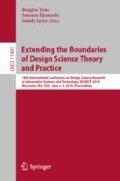Abstract
Design science research (DSR) aims to deliver innovative solutions for real-world problems. DSR produces Information Systems (IS) artifacts and design knowledge describing means-end relationships between problem and solution spaces. A key success factor of any DSR research endeavor is an appropriate understanding and description of the underlying problem space. However, existing DSR literature lacks a solid conceptualization of the problem space in DSR. This paper addresses this gap and suggests a conceptualization of the problem space in DSR that builds on the four key concepts of stakeholders, needs, goals, and requirements. We showcase the application of our conceptualization in two published DSR projects. Our work contributes methodologically to the field of DSR as it helps DSR scholars to explore and describe the problem space in terms of a set of key concepts and their relationships.
Access this chapter
Tax calculation will be finalised at checkout
Purchases are for personal use only
References
Gregor, S., Hevner, A.R.: Positioning and presenting design science research for maximum impact. MIS Q. 37, 337–355 (2013)
Kuechler, W., Vaishnavi, V.: A framework for theory development in design science research: multiple perspectives science research: multiple perspectives. J. Assoc. Inf. Syst. 13, 395–424 (2012)
Peffers, K., Tuunanen, T., Rothenberger, M.A., Chatterjee, S.: A design science research methodology for information systems research. J. Manage. Inf. Syst. 24, 45–77 (2007)
Venable, J., Pries-Heje, J., Baskerville, R.: FEDS: a framework for evaluation in design science research. Eur. J. Inf. Syst. 25, 77–89 (2016)
Sonnenberg, C., vom Brocke, J.: Evaluations in the science of the artificial – reconsidering the build-evaluate pattern in design science research. In: Peffers, K., Rothenberger, M., Kuechler, B. (eds.) DESRIST 2012. LNCS, vol. 7286, pp. 381–397. Springer, Heidelberg (2012). https://doi.org/10.1007/978-3-642-29863-9_28
Denyer, D., Tranfield, D., Van Aken, J.E.: Developing design propositions through research synthesis. Organ. Stud. 29, 393–413 (2008)
Chandra, L., Seidel, S., Gregor, S.: Prescriptive knowledge in IS research: conceptualizing design principles in terms of materiality, action, and boundary conditions. In: Proceedings of the Annual Hawaii International Conference on System Sciences, pp. 4039–4048 (2015)
Baskerville, R., Pries-Heje, J.: Explanatory design theory. Bus. Inf. Syst. Eng. 2, 271–282 (2010)
Gregor, S., Jones, D.: The anatomy of a design theory. J. Assoc. Inf. Syst. 8, 312–335 (2007)
Deng, Q., Ji, S.: A review of design science research in information systems: concept, process, outcome, and evaluation. Pacific Asia J. Assoc. Inf. Syst. 10, 1–36 (2018)
Purao, S.: Truth or Dare. J. Database Manag. 24, 51–66 (2013)
Peffers, K., Tuunanen, T., Niehaves, B.: Design science research genres: introduction to the special issue on exemplars and criteria for applicable design science research. Eur. J. Inf. Syst. 27, 129–139 (2018)
Baskerville, R., Baiyere, A., Gregor, S., Hevner, A., Rossi, M.: Design science research contributions: finding a balance between artifact and theory. J. Assoc. Inf. Syst. 19, 358–376 (2018)
Winter, R.: Design science research in Europe. Eur. J. Inf. Syst. 17, 470–475 (2008)
Van de Ven, A.H.: Engaged Scholarship: A Guide for Organizational and Social Research. Oxford University Press, Oxford (2007)
Getzels, J.W.: Problem finding: a theoretical note. Cogn. Sci. 3, 167–172 (1979)
Einstein, A., Infeld, L.: The Evolution of Physics. Simon & Schuster, New York (1938)
Dorst, K.: The core of “design thinking” and its application. Des. Stud. 32, 521–532 (2011)
Cross, N.: Expertise in design: an overview. Des. Stud. 25, 427–441 (2004)
Simon, H.: The Sciences of the Artificial. MIT Press, Cambridge (1998)
Sein, M.K., Henfridsson, O., Purao, S., Rossi, M., Lindgren, R.: Action design research. MIS Q. 35, 1–20 (2011)
Walls, J.G., Widmeyer, G.R., El Sawy, O.A.: Building an information system design theory for vigilant EIS. Inf. Syst. Res. 1, 36–59 (1992)
Hevner, A.R., March, S.T., Park, J., Ram, S.: Design science in information systems research. MIS Q. 28, 75–105 (2004)
Thuan, N.H., Drechsler, A., Antunes, P.: Construction of design science research questions. Commun. Assoc. Inf. Syst. 44(1), 20 (2019)
Zobel, J.: Writing for Computer Science, 3rd Edn. (2014)
Getzels, J.W.: Problem-finding and the inventiveness of solutions. J. Creat. Behav. 9, 12–18 (1975)
Alvesson, M., Sandberg, J.: Generating research questions through problematization. Acad. Manage. Rev. 36, 247–271 (2011)
Heidegger, M.: Basic Writings. HarperCollins, New York (1993)
ISO/IEC/IEEE International Standard: Systems and software engineering – Vocabulary. ISO/IEC/IEEE (2010)
Association for Project Management: Glossary. https://www.apm.org.uk/body-of-knowledge/glossary/
Glinz, M.: A Glossary of Requirements Engineering Terminology (2017)
Arazy, O., Kumar, N., Shapira, B.: A theory-driven design framework for social recommender systems. J. Assoc. Inf. Syst. 11, 455–490 (2010)
Meth, H., Mueller, B., Maedche, A.: Designing a requirement mining system. J. Assoc. Inf. Syst. 16, 799–837 (2015)
Author information
Authors and Affiliations
Corresponding author
Editor information
Editors and Affiliations
Rights and permissions
Copyright information
© 2019 Springer Nature Switzerland AG
About this paper
Cite this paper
Maedche, A., Gregor, S., Morana, S., Feine, J. (2019). Conceptualization of the Problem Space in Design Science Research. In: Tulu, B., Djamasbi, S., Leroy, G. (eds) Extending the Boundaries of Design Science Theory and Practice. DESRIST 2019. Lecture Notes in Computer Science(), vol 11491. Springer, Cham. https://doi.org/10.1007/978-3-030-19504-5_2
Download citation
DOI: https://doi.org/10.1007/978-3-030-19504-5_2
Published:
Publisher Name: Springer, Cham
Print ISBN: 978-3-030-19503-8
Online ISBN: 978-3-030-19504-5
eBook Packages: Computer ScienceComputer Science (R0)

